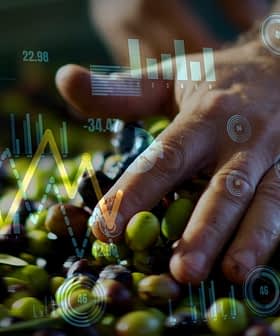The 'Flavored Extra Virgin' Oxymoron
Flavored oils are the low-hanging fruit -- an abandonment of the educational track the industry has been following to lure buyers with Sriracha and smoke.
Flavored oils have been around a long time, but these days they seem to be everywhere.
Modern life leaves dwindling time for cooking while culinary shortcuts in the Instant-Pot era offer 30-minute meals in ever fewer steps. Flavored oils provide a fat and seasoning in one swoop.
I’ve never been a fan, even going on record with a Washington Post writer back in 2013 with “harsh words for the idea” of flavoring and infusing olive oils with herbs, fruit, smoke or anything else. But there’s a special place in the wrong column in my view for bottling flavored concoctions and calling it ‘extra virgin’ on the label.
By definition, extra virgin olive oil, or even plain olive oil, can contain no additives. Once you add another ingredient, it falls into a category of an oil-based condiment and should not include “olive oil” on the front of the package at all.
Extra virgin olive oil is the only food that needs to be tasted by a human to verify its classification. Trained tasters look for subtle signs of defects that would disqualify the extra virgin status. Any additive makes this verification process impossible.
It’s not just my peeve. The International Olive Council (IOC), the U.N.-sanctioned intergovernmental organization whose standards are routinely ignored around the world, has tried to get its 15 member countries to abide by its rules that forbid calling anything with an additive ‘olive oil,’ no less ‘extra virgin.’
The IOC’s executive director, Abdellatif Ghedira, told Olive Oil Times, “flavored oils cannot be considered olive oils” and can’t be labeled as such under IOC rules.
That hasn’t stopped some of the biggest brands within IOC-member countries from doing so. “Extra virgin” on the label commands a higher price leading to greater sales. Whether or not the oil inside deserves the valuable declaration has long been conveniently overlooked by marketers.
“To guarantee greater transparency for consumers in markets around the world, it is important to respect standards and the bodies that regulate them in every country,” Ghedira added in a wishful refrain.
The problem comes down to this: When you buy chocolate milk, you can be reasonably confident it’s milk flavored with chocolate — and if you wanted to, you could get a chemistry lab to prove it. Extra virgin olive oil is a product viewed with a well-founded degree of suspicion and a long history of frauds. Add any ingredient to the mix and an independent verification becomes impossible.
From a producer’s perspective, if you’re going to add chili, Sriracha, smoke or Meyer lemons to the mix, why use extra virgin olive oil when it’s costlier to produce and defects in a lower grade would be effectively concealed by the flavoring anyway?
The reason, of course, is that extra virgin sells — whether it’s on the front of a bag of potato chips, a jar of mayonnaise, or a blend with another oil entirely.
Nancy Harmon Jenkins, an olive oil producer in Italy and author of the New Mediterranean Diet Cookbook was eager to concur. “I know there are producers I admire who make flavored oil,” she told me, “but the pure, fresh taste of high-quality olive oil is so unique that I have to ask — why bother adding to it? Would you add raspberry flavor to a high-end champagne?”
Harmon Jenkins recommends adding ingredients independently to maintain the integrity of their individual qualities. “If you want to add a little lemon or garlic or basil to the oil at the moment you’re serving it, that’s the best way. What happens with flavored oil is the same thing that happens with flavored coffee — the flavors have no sense of freshness to them at all, just old and tired Herbes de Provence added to old, tired oil.”
(A few producers who market flavored oils labeled extra virgin were asked to provide their perspectives but declined to comment.)
Slowly but surely, prompted by an endless stream of new discoveries of the health benefits attributed to extra virgin olive oil and the rise of prominent chefs who took the time to explore its culinary possibilities, consumers are finally becoming more educated on what “extra virgin” means and why it deserves the higher price tag.
Flavored oils labeled as extra virgin are the low-hanging fruit. It’s a way to move olive oil through retail by abandoning the educational track the collective industry has been following and luring buyers with Sriracha and smoke — while opening the door to even more misinformation and deceit.





